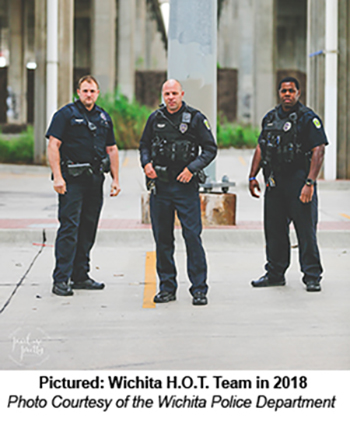Contact Us
To provide feedback on the Community Policing Dispatch, e-mail the editorial board at CPDispatch@usdoj.gov.
To obtain details on COPS Office programs, publications, and resources, contact the COPS Office Response Center at 800-421-6770 or AskCopsRC@usdoj.gov

U.S. Department of Justice
Office of Community Oriented Policing Services
Washington, DC 20530

According to the U.S. Department of Housing and Urban Development’s 2022 Annual Homelessness Assessment Report to Congress, more than half a million people experienced homelessness in the United States. Solving the problem of homelessness requires collaboration: agencies from different sectors sharing resources, information, and the skills needed to make real systemic change. Sharing the Solutions: Police-Court Partnerships to Address Homelessness was developed by the Center for Justice Innovation (formerly the Center for Court Innovation) in partnership with the U.S. Department of Justice (DOJ) Office of Community Oriented Policing Services (COPS Office) to highlight and share successful collaborations across the country among police, courts, behavioral health experts, and people with lived experience. The Center for Justice Innovation convened an advisory board of more than 20 experts from across the country to compile promising practices and recommendations for local collaborations.
Sharing the Solutions: Police-Court Partnerships to Address Homelessness has been developed for police and court professionals, people with lived experience of homelessness, behavioral health practitioners, justice reform experts, and community members interested in developing or enhancing specialty programs serving people experiencing homelessness. The toolkit provides the audience with innovative conversations among police, court, behavioral health, and policy experts discussing national trends and local solutions about homelessness. The seven-module toolkit offers roundtable discussions, podcasts, and previously recorded webinars as well as expert recommendations and resources. The toolkit was developed for those working in the field to provide best practices and helpful resources to address local and national issues.
Toolkit topics include police executive discussions on leadership and sustaining mission-driven work, community court judges sharing how they work with system and community partners to divert further justice involvement for people experiencing homelessness, the intersection of justice and behavioral health systems, police outreach teams and their collaboration with people with lived experience, transit policing and homelessness, working with court-involved veterans experiencing homelessness, and local spotlights diversion work taking place in the Texas cities of Austin and Houston. Speaking about the Downtown Austin Community Court (DACC) and its work diverting people experiencing homelessness from further justice involvement while offering supportive services, Yvonne Mboss, LCSW, DACC’s Clinical Diversion Program Supervisor, showcases how legal and behavioral experts come together to support this population. “DACC’s approach is person-centered and utilizes clinical expertise to meet people where they are, prevent involvement with the criminal justice system, reduce recidivism, and ultimately help people experiencing homelessness in their journey toward achieving stability and obtaining long-term housing. The evolution of our Clinical Diversion Program is based on diversionary principles, best practices, and compassion, and improves equity and service standardization across court and homeless services.”
The Substance Abuse and Mental Health Services Administration's Behavioral Health Services for People Who Are Homeless states that people experiencing homelessness have higher rates of physical and behavioral health needs as well as higher rates of trauma than those in the general population. Therefore, working with people experiencing homelessness requires a collaboration of cross-system stakeholders and practitioners. Advisory board member Sarah Wurzburg, Deputy Division Director of Behavioral Health at the Council of State Governments Justice Center, explains, “People who use substances and have mental illnesses are more likely to be homeless and have negative interactions with law enforcement. It is critical to support partnerships between law enforcement, the courts, behavioral health, and housing providers to better support meeting people's needs and decreasing the likelihood of future encounters with the justice system.”
Judicial partnership is vital to local collaborations and successes. The Hon. Marcia P. Hirsch serves as the Presiding Judge of the Queens Drug Treatment Court, the DWI Treatment Court, the Mental Health Court, the Veterans Court, and the Drug Diversion Court in Queens, New York. An advisory board member for this project, she illustrates how Sharing the Solutions can strengthen local collaborations that support justice-involved people experiencing homelessness. “This toolkit is a wonderful resource for courts and communities that are faced with people experiencing homelessness, who may be in crisis and could be on the verge of arrest. Innovative police practices provide a better way of connecting individuals to local programs, and behavioral and physical health treatment, resulting in improved overall public safety. Working with homeless veterans in our Veterans Treatment Court, I know that a ‘warm handoff’ to knowledgeable professionals can de-escalate a situation; jail is not treatment or the answer to homelessness.”

Experts in Research, Involvement, and Engagement agree that people with lived experience are vital partners in successful partnerships. Having an equal seat at the table to inform justice partners of real-life experiences and the collateral consequences of homelessness make people with lived experience a key partner to unlocking solutions. Eric Borsuk, author and journalist focusing on incarceration and reentry in America states, “There is an undeniable link between homelessness, prison reentry, and behavioral health needs in America. Sharing the Solutions is a necessary tool for law enforcement to better understand and address the various gaps in reentry created by justice-system involvement, in particular the lack of housing and health services for returning citizens.” Susie Rivera, a noted expert and leader in community and youth inclusion, echoes these sentiments by adding, “You can’t use incarceration to deal [with] or solve the unmet needs in our community, and the only way to get to sustainable solutions is to include those who are closest to the issues and develop partnerships and processes that center the voices of youth and young adults who are experiencing these harms. Centering voices of youth and young adults who are experiencing issues such as being unhoused not only leads to sustainable solutions but also fosters authentic partnerships that promote more healthy and healed communities.”
Sharing the Solutions highlights practitioners and consumers across the justice system taking a deep dive into promising practices and next steps toward local collaborations. Each module shares different perspectives, connection to further resources, and recommendations you may share with your communities to join in being a part of the solution. Discussing how this resource can be used by police officers interested in learning how they can develop or expand their practices, Officer Nathan Schwiethale of the Wichita (Kansas) Police Department’s Homeless Outreach Team (H.O.T.) and a Sharing the Solution Advisory Board member shares, “This toolkit is instrumental in my work with our police homeless outreach team. I recommend it to every agency.”
Bonnie Sultan
Special Advisor
Center for Justice Innovation
Subscribe to Email Updates
To sign up for monthly updates or to access your subscriber preferences, please enter your email address in the Subscribe box.






